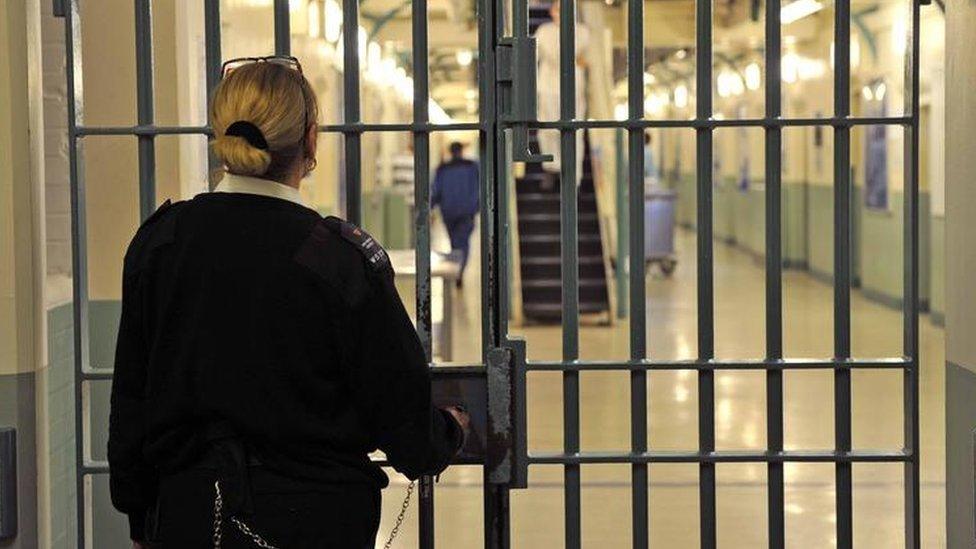Coronavirus: Prisoners' children 'forgotten' during pandemic
- Published
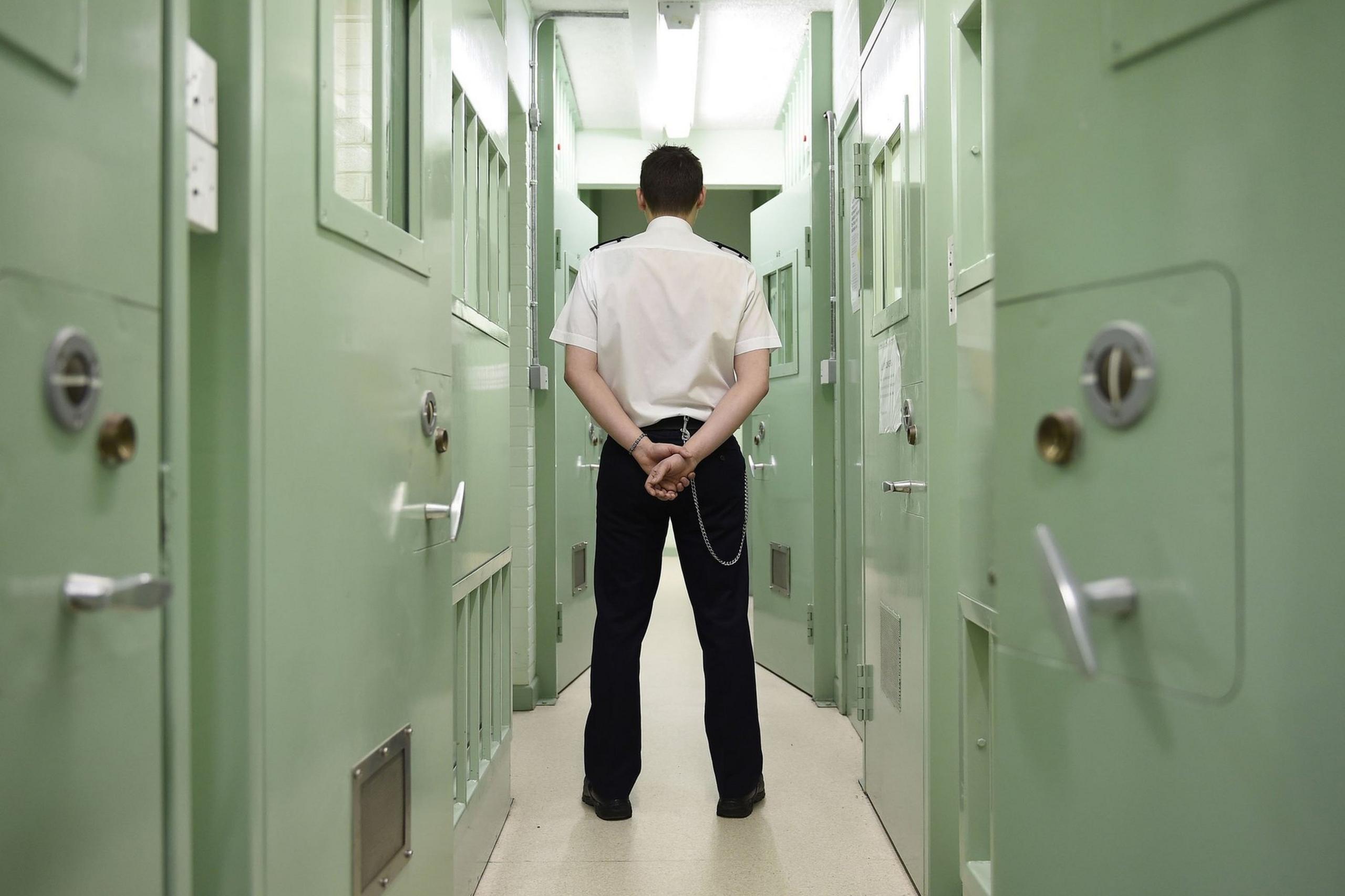
Some 300,000 children of UK prisoners have been "forgotten" during the pandemic, with some inmates limited to just one or two face-to-face visits.
Campaigners say the lack of physical contact with their parents has damaged children's mental health and infringed upon their human rights.
A video call system was not fully rolled out until nine months after the start of the pandemic with call times limited to 30 minutes a month.
The MoJ said its response saved lives.
Costed phone calls, letters and emails have been available throughout the pandemic. But campaign groups say face-to-face contact is crucial in maintaining the relationship between imprisoned parents and children.
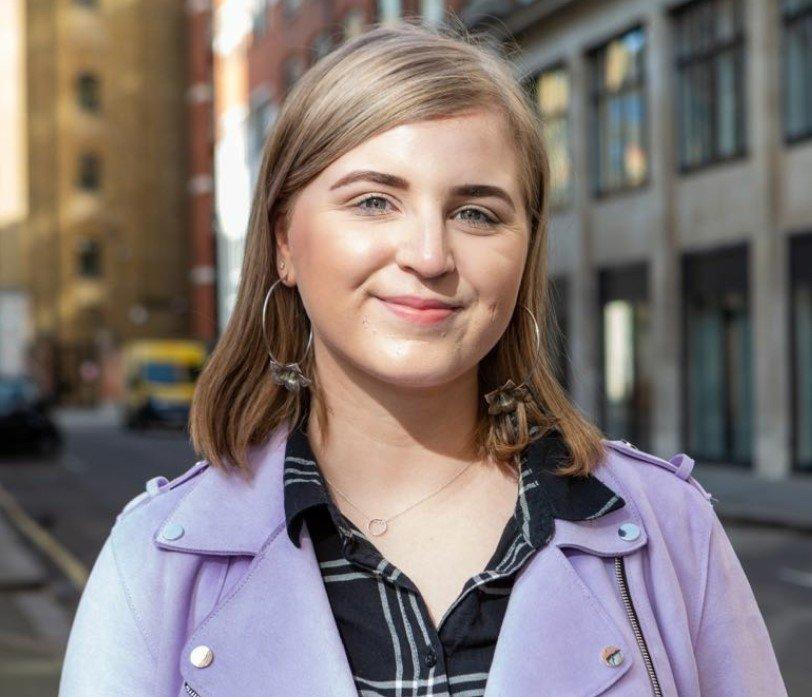
Jodie Beck said children were hardest hit by the loss of face-to-face visits in prisons
"Children have been the hardest hit by this," said Jodie Beck, co-founder of prisoner family support network Our Empty Chair. It is estimated annually there are up to 300,000 children in the UK affected by a parent in prison, according to a recent report., external
"At the sharp end of this, we have heard from people who are terrified that, when their loved one is released, their children won't recognise them. It will be like a stranger entering the home."
Miss Beck said families of prisoners who were still waiting for a definitive roadmap out of lockdown for prisons felt "forgotten".
"Although people who aren't affected by prison might assume that they are out of sight, out of mind, our communities are impacted by prisons," she said.
"The way in which the government responds to coronavirus within them has an implication on all of us."
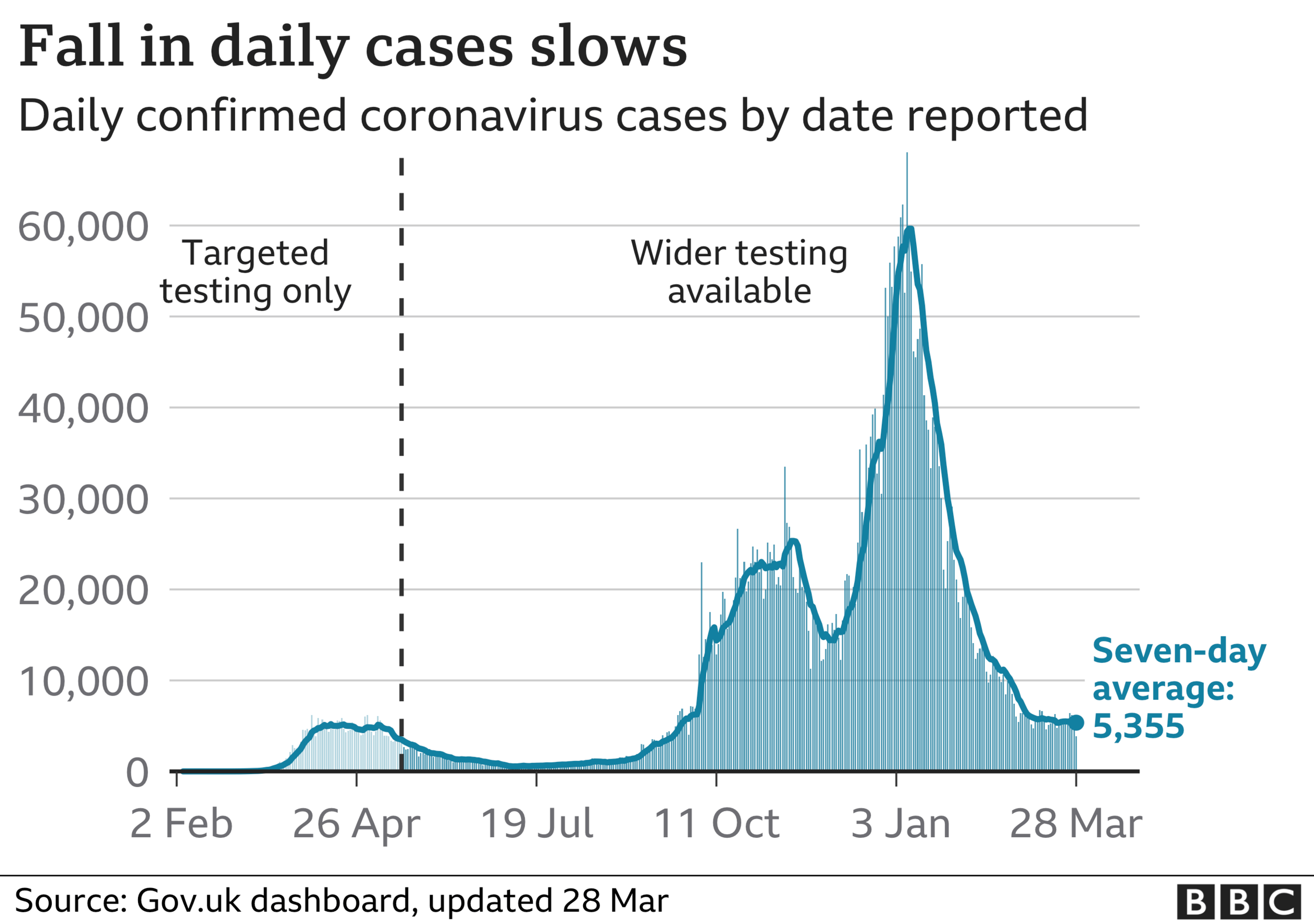
Public Health England ceased in-person visits at prisons in England and Wales on 24 March last year on the assessment that between 2,500 and 3,500 prisoners were at risk of dying from Covid-19.
Facilities were not given the all-clear to reopen visiting halls again until 6 July - providing the MoJ approved the safety measures put in place at individual sites.
The BBC has found that, while more than half of prisons resumed visits by the end of July, some 5,000 inmates had to wait until September or later.
Among them, HMP Leicester did not reopen until 26 October, just 11 days before it was locked down again.
Almost all prisons in England and Wales remain closed to visits and have been since 5 January. However, the government began loosening restrictions at sites where infection rates were "under control" on Monday, 29 March.
Families taking legal action
Jake Richards, a barrister representing seven families in a legal action against the Ministry of Justice, said there was still no "coherent plan" to make sure children maintained face-to-face contact with imprisoned parents.
Campaign groups have suggested introducing rapid testing and vaccinating prisoners and staff as a priority, allowing social visits to resume even during national lockdowns.
This "lack of mitigating measures", Mr Richards said, amounted to an infringement of the right to a family life under the European Convention on Human Rights.
He said: "We've all suffered, we all went long periods without seeing our loved ones but we've also been able to use Zoom or see them in the park from afar.
"That's not been the case for these children. They are wholly innocent; they have not done anything wrong and the effect on them of that lack of contact has been really severe."

Barrister Jake Richards said the effect on children had been severe
In April 2020, the government contracted Norfolk-based Purple Visits to implement a "military grade security" video calling system to replace the loss of in-person visits.
While HMP Berwyn in north Wales went live with the calls on 1 April, Purple Visits was not fully rolled out until December, nine months after the start of the pandemic. The calls were limited to half-an-hour a month.
"One mother had her call stopped because her children's feet were on show and that was deemed as nudity," said Sarah Burrows, the chief executive of Children Heard and Seen, which provides support to families with a parent in prison.
"We also had an example of a sneeze ending a call and one family could hear inappropriate conversations around them."
"Children with a parent in prison are really invisible in this country anyway. There is no way to support those children, those children are isolated and Covid has increased that sense of isolation," she added.
Video calls 'horrendous'
Michelle, from Lincolnshire, has been looking after her and her husband's three children alone since he was imprisoned in late 2019.
Though HMP Humber in East Yorkshire was among the first to reinstate in-person visits on 8 July, she has only seen him four times since the start of the pandemic.
Under Covid-19 restrictions the visits were limited to an hour a month and only three people could attend, meaning Michelle had to decide which child could not go.
Strict safety precautions meant the visiting halls were installed with thick, clear screens between prisoners and their visitors.
"Because of the security reasons they couldn't cut holes through the screen so we couldn't hear each other," Michelle said.
"There was no speaker system and no way of hearing - we had to shout in a room full of other people."
Video calling was introduced at HMP Humber in mid-summer. But Michelle said the quality of the calls, which cut out if there was too much movement on-screen, was poor.
She said: "My youngest is four and he wants to move around, he doesn't have the attention span.
"Within the 30 minutes of the call we would probably have about five minutes of conversation."
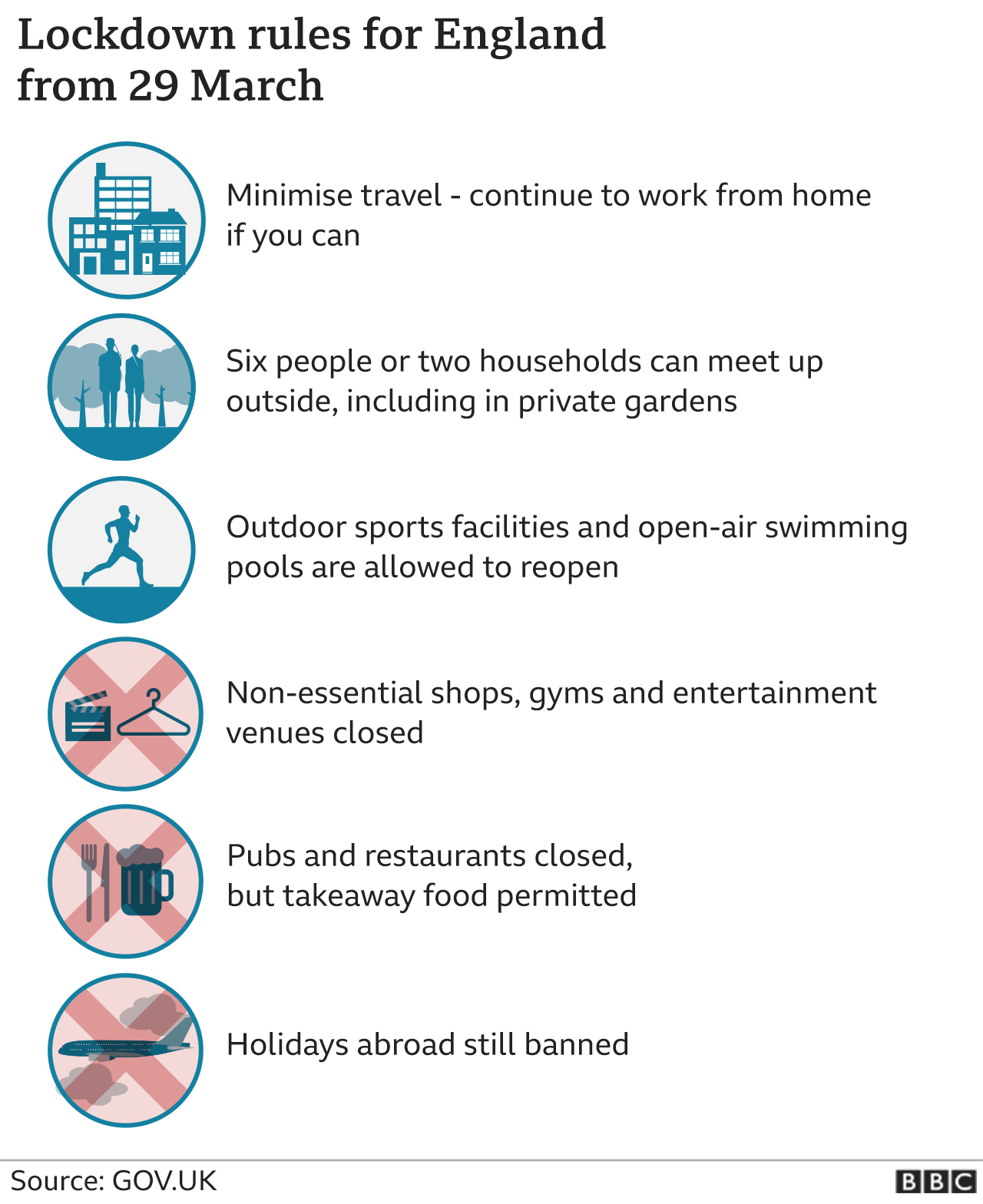
Another mother, Jessica, not her real name, was not approved for a video call with the father of her four children until September last year.
"We were really excited because we hadn't seen his face since February," she said. "But it was such a disappointment.
"We had 30 minutes booked, 20 minutes of those we were re-verifying continuously.
"For the last 10 minutes we just cut off because it was just tormenting the children."
Prisoner suicides 'worryingly high'
Since the start of the pandemic, 93 prisoners have died from coronavirus according to the MoJ, which is well below the worst-case predictions.
But Mr Richards said the balance between safety and protecting children's rights had not been struck, particularly as there have been exceptions made for children in care, among others, to continue to see their parents.
Prisoners have been kept on 23-hour-a-day cell lockdowns for almost all of the pandemic. Gym sessions, training and prison jobs have been largely suspended.
The charity Inquest said it was concerned prisoners were being held in "prolonged solitary confinement", which it said could have a "harmful, long-term impact" on inmates, especially those with mental or physical health conditions.
Men were locked in their cells without showers or exercise for up to 14 days at HMP Wandsworth and HMP Portland, it said.
An inspectorate report of HMP Leicester in December found cells were too cold, contained cockroaches and did not have adequate screening around toilets.

LOOK-UP TOOL: How many cases in your area?
LOCKDOWN RULES: What are they and when will they end?
SOCIAL DISTANCING: How can I meet my friend safely?
FACE MASKS: When do I need to wear one?

Inquest told a select committee conditions in prisons were leading to a "worryingly high" number of self-inflicted deaths, external in the early part of the pandemic, considering how prisoners were largely locked in their cells during that time.
Figures show 28 prisoners took their own lives during the first national lockdown.
The Ministry of Justice said it was working to improve the Purple Visits system and said 97% of prisoners surveyed agreed the video calls had a positive impact on their mental health.
A spokesman for the MoJ said: "There is no question our response has saved lives and helped protect the NHS, with infections and deaths in prisons significantly lower than predicted at the start of the pandemic.
"Each prison opened up when it was safe to do so last summer, and we have another clear evidence-based plan for easing the current restrictions to ensure prisoners are kept safe without being subject to the strictest measures for any longer than necessary."
If you have been affected by issues raised in this story, sources of support are available via the BBC Action Line.

More about this story
The Shared Data Unit makes data journalism available to news organisations across the media industry, as part of a partnership between the BBC and the News Media Association.
For more information on methodology, click here, external. For the full dataset, click here, external. Read more about the Local News Partnerships here.
- Published11 February 2021
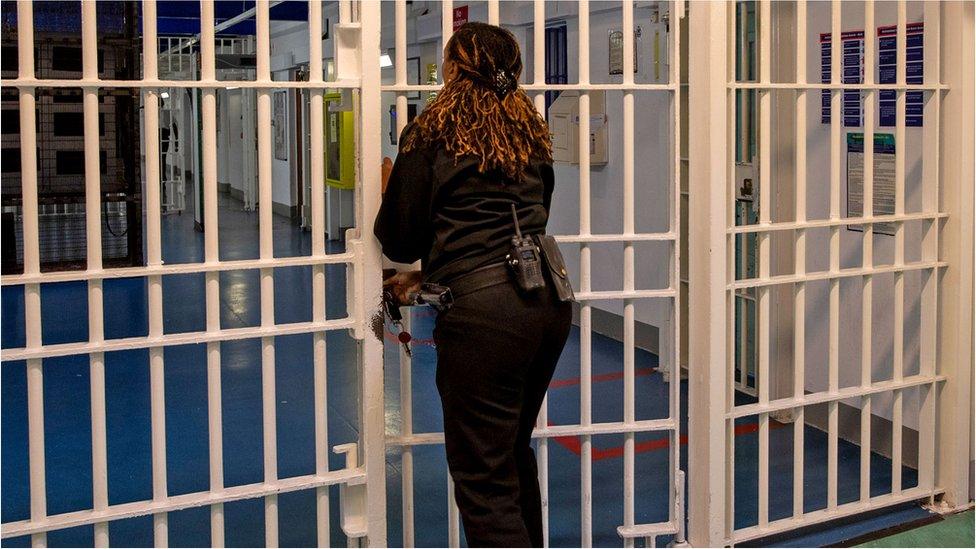
- Published19 March 2021
